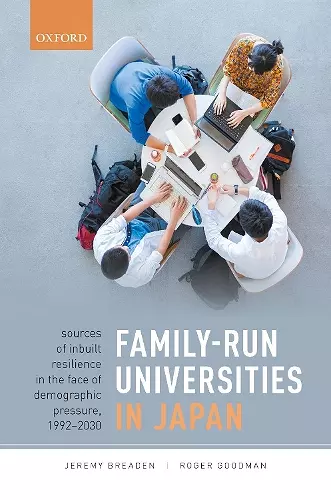Family-Run Universities in Japan
Sources of Inbuilt Resilience in the Face of Demographic Pressure, 1992-2030
Roger Goodman author Jeremy Breaden author
Format:Hardback
Publisher:Oxford University Press
Published:2nd Jul '20
Currently unavailable, and unfortunately no date known when it will be back
This hardback is available in another edition too:
- Paperback£25.00(9780198879756)

Globally, private universities enrol one in three of all higher education students. In Japan, which has the second largest higher education system in the world in terms of overall expenditure, almost 80% of all university students attend private institutions. According to some estimates up to 40% of these institutions are family businesses in the sense that members of a single family have substantive ownership or control over their operation. This book offers a detailed historical, sociological, and ethnographic analysis of this important, but largely under-studied, category of private universities as family business. It examines how such universities in Japan have negotiated a period of major demographic decline since the 1990s: their experiments in restructuring and reform, the diverse experiences of those who worked and studied within them and, above all, their unexpected resilience. It argues that this resilience derives from a number of 'inbuilt' strengths of family business which are often overlooked in conventional descriptions of higher education systems and in predictions regarding the capacity of universities to cope with dramatic changes in their operating environment. This book offers a new perspective on recent changes in the Japanese higher education sector and contributes to an emerging literature on private higher education and family business across the world.
Breaden and Goodman's in depth exploration of the resilience of Japanese familyrun universities in Japan offers a much needed contribution to research on this significant but hitherto understudied phenomenon. The book will be of interest to scholars and graduate students specializing in Japanese or comparative higher education as well as to university administrators themselves. * Reiko Yamada, Monumenta Nipponica *
The authors give a thorough historical overview of Japanese private university management and use statistical data to get to the heart of the problem. * Hirochika Nakamaki, National Museum of Ethnology, Japan, Journal of Royal Anthropological Institute *
This book is much more than its rather prosaic title. It is a comprehensive and illuminating analysis of private higher education in Japan and worldwide, a focus on the understudied phenomenon of family-owned universities in Japan, a case study of Japanese family-owned university, and a discussion of the likely future of Japanese private higher education. All of this is cogently argued, engagingly written, and packaged into a 223 page volume. * Philip Altbach, Boston College, USA, Japanese Studies *
The authors' main argument that the resilience of family-run universities plays a significant role especially in the face of the many challenges may meet the demand of family-run universities in Asia-Pacific region because the authors have successfully integrated comparative perspectives of family business both in Japan and other regions, and thus made generalization of the core concept of the strength of family-run universities, stemmed from the inbuilt resilience. * Kazuhito Obara, Asia Pacific Journal of Education *
Overall, Family-Run Universities in Japan is well-written, exceptionally researched, and provides much food for thought. It offers a wealth of data, insights, and micro-level theorizations that will provide numerous jumping off points for further study in a range of different fields. * Christopher D. Hammond, Higher Education *
An enormously profound picture of the Japanese higher education system ... An enormous wealth of information on higher education and society in a single country -- discussed as well as being not just typical for a single country -- is well collected and convincingly presented with a lesson: a specific social phenomenon can be understood well, if one is ready for the adventure of getting to know in detail the enormous complexity of conditions. * Ulrich Teichler, Contemporary Japan *
It offers a wealth of data, insights, and micro-level theorizations that will provide numerous jumping off points for further study in a range of different fields. * Christopher D. Hammond, Aoyama Gakuin University, Higher Education (2021) 82:233–235 *
ISBN: 9780198863496
Dimensions: 234mm x 160mm x 21mm
Weight: 556g
278 pages